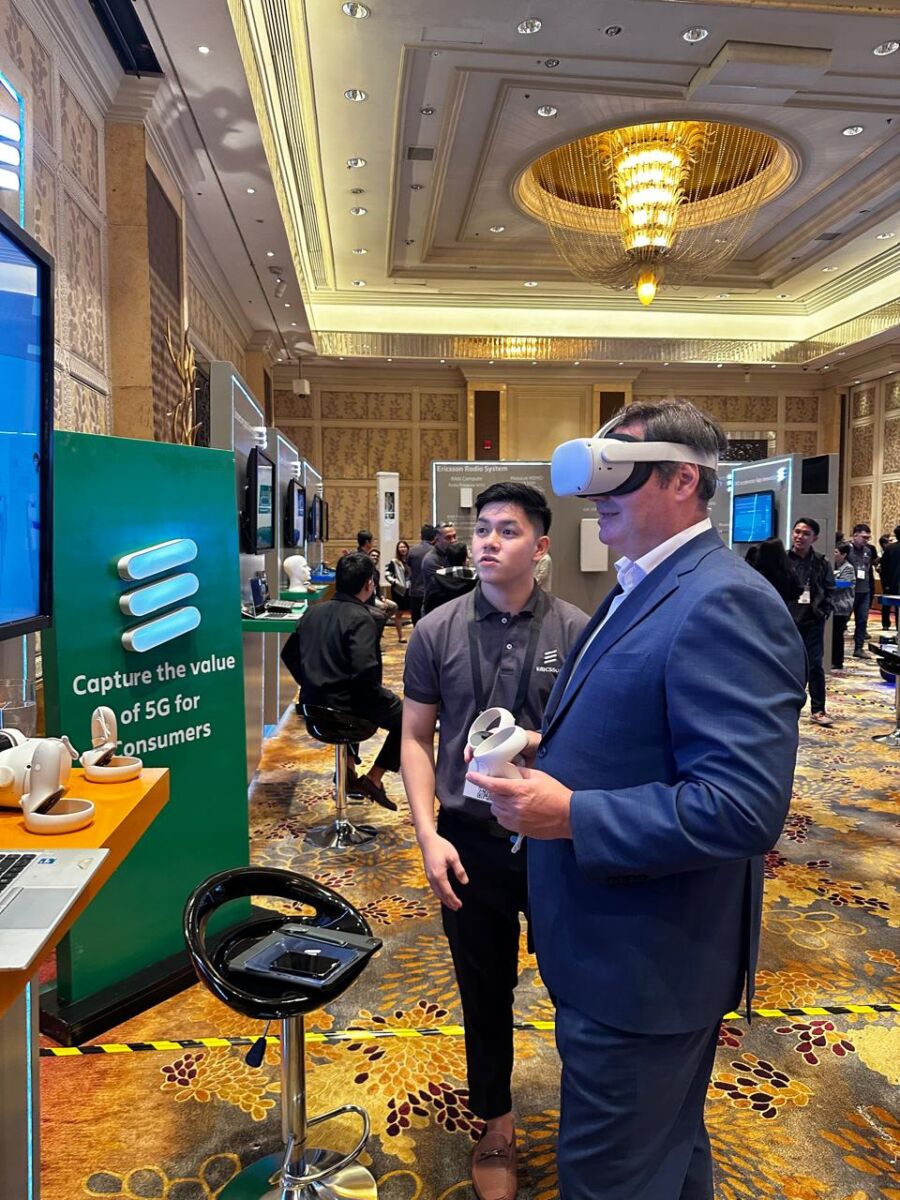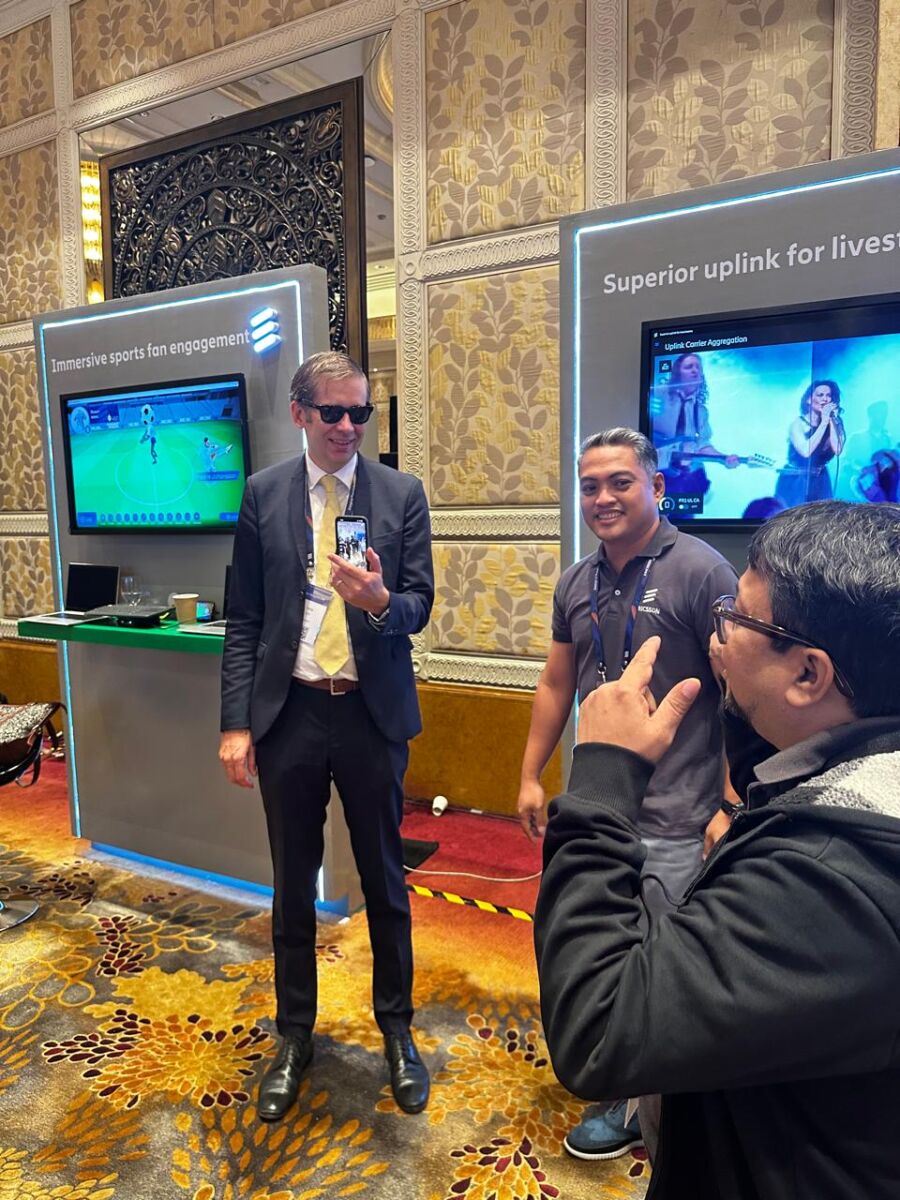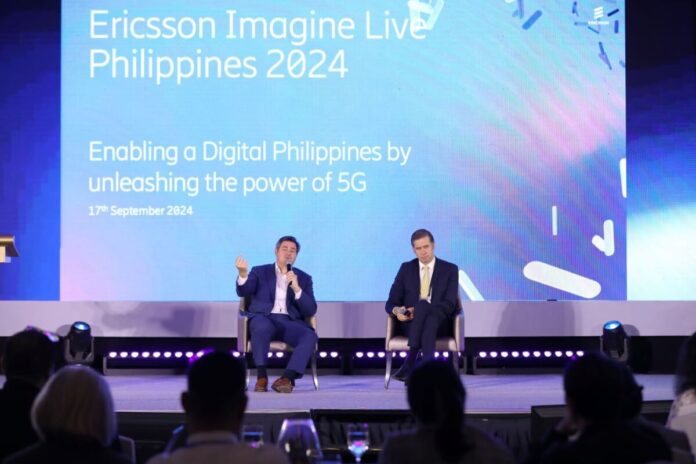Ericsson has unveiled its Ericsson Imagine Live 2024 roadshow in the Philippines, showcasing Ericsson’s advanced technology solutions and 5G use cases that are relevant for Philippines as it transitions to a digital economy.

Speaking at the inaugural session of Ericsson Imagine Live, Andres Vicente, head of Ericsson Southeast Asia, Oceania, and India, highlighted the role of 5G infrastructure in accelerating the digitalization of the Philippines and ensuring its sustainable economic growth. “5G is an innovation platform for driving the digital transformation of businesses and society. Ericsson research shows that, on average, a 10% increase in mobile broadband adoption can increase economic growth (GDP) by up to 0.8%. At Ericsson, we look forward to partnering with the Philippines Government on its digitalization initiatives and towards building a strong digital infrastructure for the country through 5G.”
5G allows technologies such as AI and cloud computing to be leveraged at scale on top of secure, reliable, and always available 5G networks, thereby opening new possibilities for consumers and enterprises.
Digital transformation provides extensive opportunities for creating new value, gaining competitive advantage, and enabling cost savings for enterprises. For consumers, 5G would lead to more immersive experiences, faster download speeds, smoother video streaming, and more responsive gaming. Better connectivity also translates to better healthcare through telemedicine, improved education through remote learning, and better quality of life.
“More affordable 5G smartphones, a maturing 5G ecosystem, coupled with accelerated 5G deployments, will serve to boost 5G adoption in Philippines. Investments in 5G deployments will not only enhance 5G coverage but will also lead to a better quality of service for consumers,” states Daniel Ode, Head of Ericsson Singapore, Philippines, and Brunei. With more investments being made in 5G, over 40% of the total mobile subscriptions in the Philippines are expected to be on 5G by 2030.
According to the Ericsson Mobility Report, 5G is seeing a robust uptake worldwide, with 5G subscriptions reaching 1.9 billion globally at the end of Q2 2024. 5G mobile subscriptions are set to reach nearly 5.6 billion in 2029, making up 60 percent of all mobile subscriptions at that time. In the Philippines, 5G subscriptions currently stand at around 9% of the total mobile subscriptions.
Looking beyond the enhanced Mobile Broadband, there is a strong potential for Fixed Wireless Access (FWA) in the Philippines, given its challenging geography, limited infrastructure to deploy fixed broadband, and more than 40% rural population. According to an Ericsson Consumer Lab Study, 1 in 3 households in the Philippines rely on mobile connectivity (via FWA, smartphone, mobile hotspot, or similar) at home, indicating a strong appetite for a 5G FWA offering. Based on the right user experience being provided for people, there will be a massive adoption and opportunity for further uptake of FWA in the Philippines.
“The time to make investments in the 5G networks in the Philippines is now. 5G will serve as the critical infrastructure that will accelerate the digitalization of enterprises, transform consumer experiences and provide the country with a competitive edge when it comes to attracting foreign investments in the country,” states Andres Vicente.
Given its technology leadership and global deployment experience, Ericsson is well poised to support communication service providers in the Philippines in seamlessly transitioning to 5 G. Today, around 320 5G networks are in commercial service globally, and Ericsson is leading the market, powering 166 live 5G networks to date across five continents.
Ericsson is at the forefront of 5G around the world and is recognized as an industry leader by the Frost Radar: Global 5G Network Infrastructure Market report. Maintaining top ranking in the Frost Radar report over the past years has shown that Ericsson’s investments in R&D and across a wide product portfolio — which includes all areas of 5G network infrastructure as well as previous generations of network infrastructure — are valued in a market where technology is constantly evolving.
With its presence of more than 36 years in the Philippines, Ericsson remains committed to supporting the government’s digital agenda and enabling its customers, the communication service providers, to capture the value of 5G.
Ericsson Imagine Live
The 5G use cases and demonstrations were organized in four zones:
- Capture the Value of 5G for Consumers
- Capture the Value of 5G for Enterprises
- Shape our Future Together
- Programmable Networks
Referring to the four zones in which the demos were organized, Andres Vicente stated that the advent of 5G is opening new opportunities for communications service providers (CSPs) both in the established mobile broadband business and through the exploration of new value pools.

In the ‘Capture the value of 5G for Consumers’ zone, consumers can experience sports like never before with the Immersive Sports Fan experience demo, where a feature-rich app allows sports clubs to engage directly with their vast fan bases, creating new revenue streams. Leveraging network slicing and APIs, CSPs can ensure the immersive fan experience and gain revenue share. As per an Ericsson ConsumerLab Study on capturing 5G value: Turning performance into loyalty’, 5G users in the Philippines spend, on average, 25 minutes more per day than users in the 5G early adopter markets on data-demanding digital services such as streaming video in 4K/HD format, doing video calling, multiplayer mobile gaming, and e-sports.

Another demo called ‘Superior Uplink for livestreams” offers seamless real-time livestreaming via commercially available smart glasses, overcoming the hindrance of 5G upload speeds with Uplink Carrier Aggregation. This technology boosts upload speeds by combining frequencies, enhancing performance, promoting 5G Standalone adoption, and optimizing spectrum utilization.
In the ‘Programmable Networks’ zone, Ericsson showcases how it is transforming the mobile network landscape by enabling sustainable and scalable service differentiation for premium 5G experiences with Service Level Agreement assurance, revolutionizing CSP offerings. Ericsson’s new software toolkit with advanced RAN and Core capabilities empowers CSPs to seize growth opportunities by providing differentiated connectivity at scale.
Another demo showcases how Ericsson’s RedCap technology supports CSPs’ business growth by reducing the complexity and size of device platforms for mid-tier use cases, expanding the 5G ecosystem to cater to diverse connectivity needs across consumer and enterprise/industrial segments on both FDD and TDD bands.
The ‘Capture the value of 5G for Enterprises”’ zone showcases how critical infrastructure industries such as mines, wind farms, and oil refineries can enhance worker safety and efficiency with 5G. Partnering with RealWear and OverIT, Ericsson is enabling secure, reliable, real-time access to complex data in order to provide an immersive connected worker experience for use in hazardous environments where accurate positioning and the ability to handle a high density of connected devices is required. The “Connected vehicles” demo explores the potential of connected vehicles along with how enterprise-grade connectivity can truly revolutionize transportation.
In the ‘Shape our Future Together’ zone, Ericsson is demonstrating high bandwidth-demanding use cases with world-leading brands such as Toyota and Sony using QoD API with network slicing. This underscores Ericsson’s thought leadership in the Network API and 5G monetization space, aligning with the Company’s strategy to build a platform business and its vision of industry cooperation with strong partners.
The zone also features “Teaching with technology” program which showcases the use of VR modules and ICT learning tools to help create a more engaging learning experience for students, helping them to retain knowledge, improve critical thinking, and develop digital skills. Students are enabled to interact with virtual students, in different immersive scenarios that mimic real-life classroom situations. More than 1,000 teachers from nine public high schools in the Philippines are currently participating in this program.
